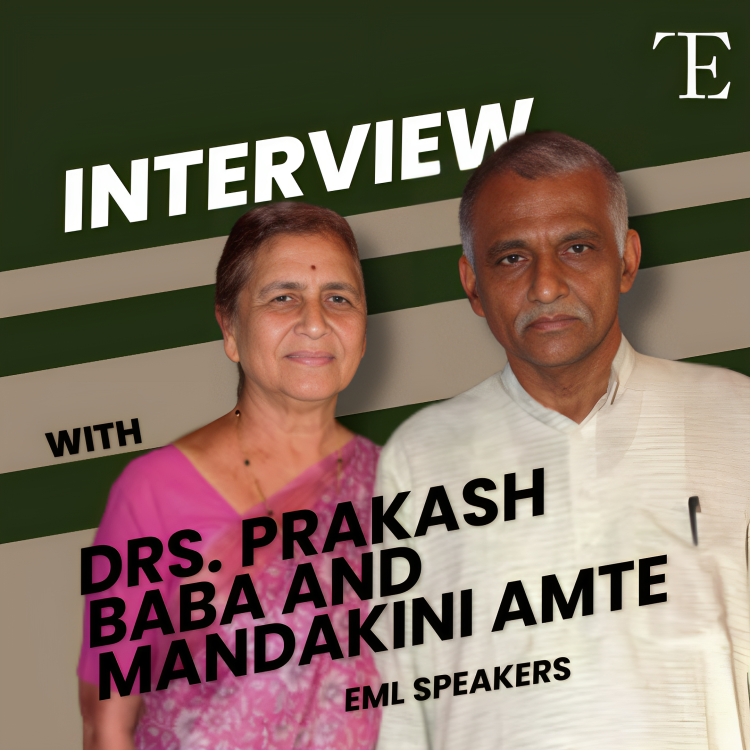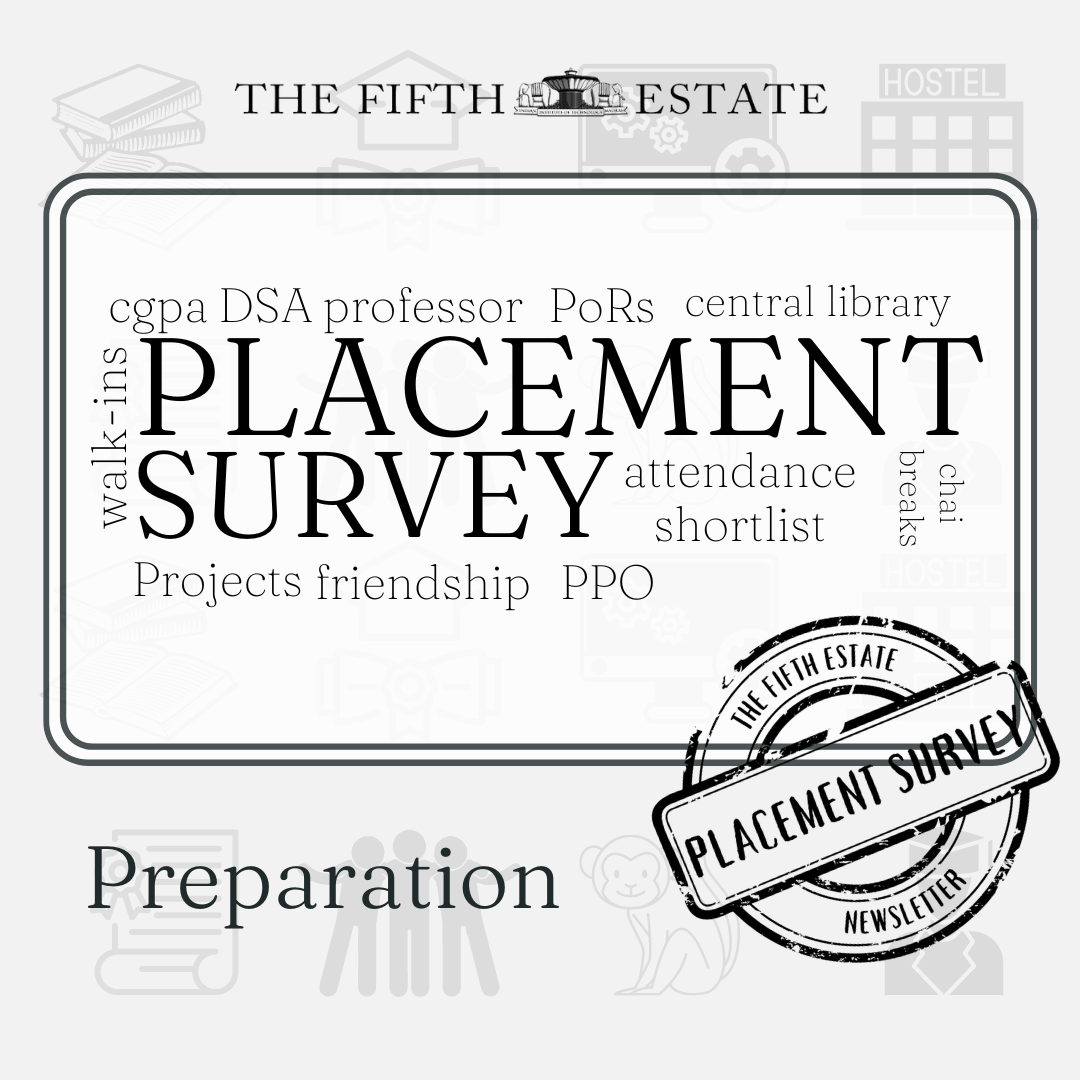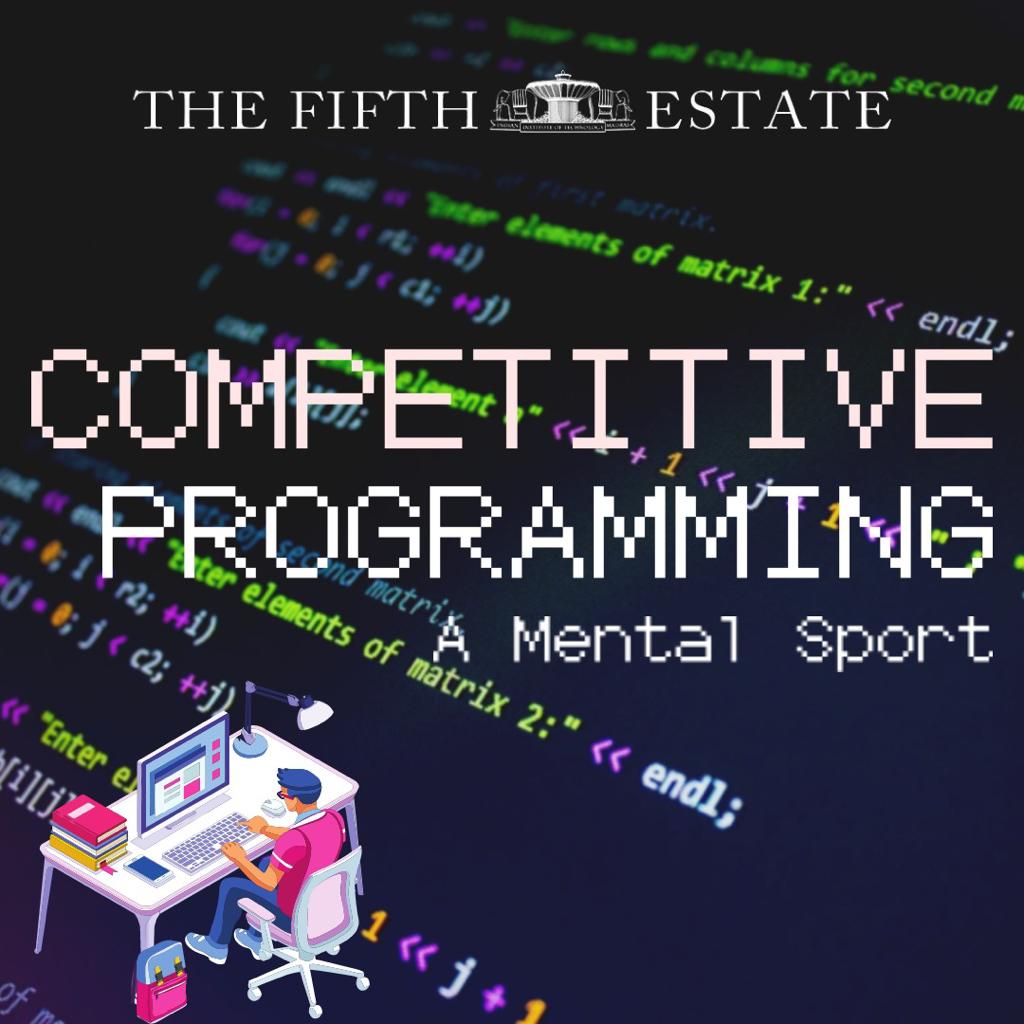On the Evening of 15th September, The Fifth Estate got the opportunity to meet Dr. Prakash Baba Amte and Dr. Mandakini Amte, doctors and social workers who have devoted their lives to the development and uplifting of the tribal people in the forests of eastern Maharashtra. They had just about a day to spend on campus and had to deliver an Extra Mural Lecture later in the evening. Amidst coffee and pleasantries, they shared their experiences and insights in the lounge of the Bose Einstein Guest House on campus. We thank the team at Extra Mural Lectures (EML) for hosting the speaker with impeccable hospitality and facilitating our interaction with them. The excerpts of that conversation can be found below:
Good Evening from The Fifth Estate! We’re looking forward to the interview with you, which is an excellent opportunity for the insti junta to learn and grow from the insights you’ll be sharing.
We’ve always been curious on what motivated you to leave a high-paying job and choose social service? And how was Mandakini Tai’s role pivotal for you?
Prakash Baba: We both had different reasons to go into social service. For me and my brother Vikas, social service had always been there in the household through our parents, Baba Amte and Sadhana Amte, so it was not difficult. We had seen fellow human beings living a very hard life right from childhood. Baba worked for leprosy patients, the blind and the disabled, and we had decided to carry that work forward. But the turning point came when after completing my MBBS, Baba took us to visit the patients he was working for, and I saw them living in very dilapidated conditions. That was when I decided to make this my life’s work. For her (Mandakini), the reasons were different (laughs).
Mandakini Tai: Till MBBS, I lived an ordinary life in Nagpur. I did not have any lineage in social work. When I met Prakash during post-graduation, he was working in surgery and I was working in anesthesia. We became friends, gradually fell in love and decided to marry. Till that time, I thought we were going to lead an ordinary life. I knew a bit about Baba Amte and his work in Anand Van for leprosy patients, but not much. Prakash told me that he was not going to work in Anand Van, but even farther, in the Adivasi villages of the remote Gadchiroli district, and that if I agreed with this, we would marry. Back then in my youth, I didn’t have much idea about living in jungles. I had visited hill stations like Melghat and Chikhaldara, but they had all the amenities. Whereas, where we were going to live and work, I had no idea about that place. Before Prakash told me about this, I was planning to work in academia or private practice, but afterward, I gave my word to Prakash that I would support him. After our marriage, when we actually went to the village, I had the full realisation that there would be no facilities, no settlements here, only the jungle! We were going to work for a very backward community. But since I had given my word, we began our work with hope and perseverance.
How did you choose Hemalkasa, and what challenges did you face there? How did you gain the trust of the community there and change their view? Any memorable experience from your initial days there?
Prakash Baba: In 1970, when Baba took us for the visit, we resolved to dedicate our life to this work. But you need a place to work. So, we applied to the Govt of Maharashtra for a place. But as you know, bureaucracy is unresponsive most of the time, and you need to have constant follow-ups. But one good thing that came out of this was, because the Govt of Maharashtra delayed the process, we could get married in the meantime (smiles). I should thank them for that. Because of their delay, I got a partner for a lifetime. The process took 3 years to complete. In December 1973, the govt gave us a few remote villages to choose from. Hemalkasa was the village that would be cut off from the outside world for 6 months during extreme weather. The other two places used to be cut off for 9 months. So, considering 6 months more feasible than others, Hemalkasa was chosen.
Challenges were many, the foremost being isolation. Apart from us both and a few volunteers, we had no one to talk to. Perseverance and patience in those times were difficult to keep. For months on end, we would eat the same type of food. Second, the communities we had come for did not trust us at all. Their thinking used to be – ‘We did not invite these people, what agenda do they have? For years, our mantriks and pujaris have sufficed for our wants and needs, so why would we need these people?’ Coming so far after leaving everything behind for people who didn’t even trust us was frustrating at times. To overcome these hindrances, we decided to learn their language. Mandakini prepared a dictionary from Madia language to Marathi with the help of govt officers who had postings in the village. Next, we tried to know their customs. We realised that any time someone would fall ill, they would be taken to the mantrik. The people in the village had deep trust in black magic. Animal sacrifices were common, but we had also heard about narbali (human sacrifices). We understood the catch in the situation – the people who would be treated successfully by the mantrik were the ones having minor illnesses that are healed through the body’s immune system in most instances, but the mantrik would take the credit for curing them. For the critical patients, the mantrik would throw his hands up, and leave everything to God. Those critical patients would be lying in makeshift rooms outside the houses, left to die. We asked for a chance to cure them. I always say, to our good fate, the initial patients went home completely healthy again. We used to discuss, read and identify the disease from the symptoms. After treatment, the patient would go home on his own feet, carrying the crude stretcher on which he came, on his shoulders. And this advertised our work. The people gradually started trusting us, and in 2 years, we were able to cure approximately 40,000 patients. We also kept our living very simple, so that the villagers would not be shy to approach us. They did not even know what clothes were, so it was shameful for us to be completely covered in clothes while they were shivering in the cold.
We did not have any specific plan ready. We had just thought about establishing a clinic and then expanding it to a proper hospital there. But just a hospital in the village does not lead to its progress. If we would tell them to take pills after meals, we had to ensure that first they had access to a proper meal. For that, we provided them with farming education and crop production. There were many public schemes for them, that they were completely unaware of. They had to be made aware of their rights and education. So, in 1976, we started a school in the village. For that, we faced resistance initially, but later we got a good response. We started with just 25 children. Our team of volunteers was very devoted and contributed in every way possible. All these initiatives just built themselves over the course of time, without us specifically planning anything.
Mandakini Tai: Except for a few vegetables, the people were unaware of most crops. Things like turmeric, oil, etc. were never a part of their life. So, we used to give them seed packets and fruit tree saplings to plant near their houses to provide them with holistic nutrition. There was no mechanisation though, every process was through manpower, as they didn’t even have basic facilities like electricity for many years. They also lacked access to long-lasting wells for water supply. As they used river water for all purposes, diseases like diarrhea and dysentery were prevalent. We faced the same problems, so we got a machine from Chandrapur and built a borewell. We recommended similar borewells for the villagers to the Travel Commissioner present there. For all the borewells in the village, we only would take up maintenance tasks. This way, within 2 years, almost 86 villages had tube wells. The villagers gained access to clean water, and waterborne diseases were reduced by 50%.
In your long and illustrious career, what do you consider your most significant achievement in improving the lives of marginalized communities?
Prakash Baba: For me, being able to save lives is the most impactful work. In any social work, if you are a doctor, that has a more profound influence on people’s lives. We tried to give an alternative to the traditional customs practised by these people, and without enforcing it on them. Introducing them to education and sustainable farming practices followed, but providing health care and a hospital for the people is the closest to a significant achievement in improving their lives in my opinion.
Which is the most important current social/rural issue that should be addressed on a priority basis?
Prakash Baba: Education is of essential importance. You are an IITian, right? You must be aware of the state of Zilla Parishad schools. Unfortunately, the education infrastructure in those schools is quite dilapidated. Compare that with the quality of education you are having right now. The need of the hour is concerted efforts by the govt and NGOs to improve the quality of education for the children here. If they have strong foundations of basic education till Class XII, they can avail employment opportunities. Creating avenues for employment is also essential, otherwise, how will they make use of their education? Awareness about farming should be incorporated as well. Their primitive farming should transition into advanced, mechanised methods. Facilities like enough water supply and excellent quality seeds should be made available to them. Instead of wresting them out of their villages, we should take technology, solutions and support to them. Gandhiji had said, ‘Go to the villages, and help them develop’. The percentage of children educated in our village who want to come back and work for the village’s development is 70-80%. We have doctors, teachers, lawyers, forest guards, police, and more. They have all come back to the district to work.
Mandakini Tai: Another challenge is language. The teachers who are transferred to schools here and the students don’t speak the same language. So, the teacher has no interest in teaching and the students have no encouragement to study. But still, our children here have thrived and come back. If they have monetary and employment incentives in their own village, why will they seek to go far away? Nowadays, it is difficult for them to get employment in cities as well. If this happens, frustration envelops them. ‘If I am educated and have learned so much and still can’t get financial security, what is the use of such an education?’ is their thought process. These people are not attracted to cities much, they still want to work in their villages only. So, employment generation should be on priority in these villages.
At IITM, we live in the company of deer and monkeys, and the conflict with monkeys is one of the pressing problems. Considering your success with treating wild animals, what are your thoughts on countering human-wildlife conflict?
Prakash Baba: Deforestation and imbalance are the primary stressors of any human-wildlife conflict. There is a mandate to have 33% forest cover, but that is certainly not the status in the country currently. It is nice to see harmony on the campus here. In my experience, no wild animal harms you unless it feels threatened/attacked. As for the monkeys, if their jungles are depleted, they will obviously come up to humans for their sources of food. Nature has its own ecosystem and systems of balance that facilitate symbiotic relationships between animals, but it is humans who have destroyed it on a mass scale. The broader issues also include population explosion and increasing human wants disguised as needs.
Mandakini Tai: India’s population has jumped from 33 crores to 130 crores. This increases the pressure on forests, water bodies and more. Gandhiji had said, ‘Know the difference between your need and greed.’ These pressures can be reduced only if we are mindful of our needs and keep a limit. We kept our needs minimal and simple, and we have no regrets about it.
IITM has an organisation called IViL – IIT for Villages, which works on different aspects of rural development. What advice do you have for students passionate about social work and working for rural communities?
Prakash Baba: One way you can contribute is by trying to devise low-cost agricultural equipment as a product of technical solutions. IIT Bombay has contributed to devising medical equipment. It is not possible and practical even, for everyone to go into villages and work, but if we can contribute through innovative solutions, it will suffice. Students should go on village visits to get a first-hand experience of rural life, identify the problems, and come up with low-cost solutions.
So as IITians, most of us run behind money. How can we try to walk on a similar path as you where service and selflessness takes priority?
Prakash Baba and Mandakini Tai: In general, exposure is of prime importance. You should get to know how people from the Below Poverty Line strata have a strikingly different lifestyle than you. If you compare it with the upper economic sections, there is no limit. But if you experience the lives of rural people closely in your youth, it impacts you subconsciously. There are organisations working for them, go visit them and the villages through them. The people’s daily living, habits and how they live life without any complaints with the most minimal needs, are things that can prove to be quite impactful for you. From my personal experience, if Baba hadn’t taken us on a visit, this Hemalkasa project wouldn’t have seen the day. Because of me, Mandakini was roped in, and because of her, a team of volunteers came in. and they all happily accepted this work, going strong for 50 years and counting. Because of us, our children and their spouses were also inspired to work along the same lines. This way, the encouragement to work gradually spread across people and generations. You can do the same. If nothing else, even minimising your needs mindfully is of great help. Simple things like reducing food wastage, and adopting sustainable clothing go a long way. There are many avenues to help directly and indirectly. If everyone lends a hand according to their capacity, holistic development of the villages and the country is not far.
The interview concluded with a group picture to which they heartfully agreed. We finished our coffees, exchanged closing remarks, took their blessings and they went to get ready for their Lecture for IITM students.

Edited by Ashita Anil

Soniya Kute
I am a Second Year student of Humanities and Social Sciences Department, pursuing Integrated MA in English Studies. I dabble in journaling, doodling, poetry and football. Huge fan of classics. Can't survive without coffee.




